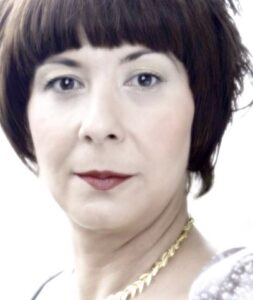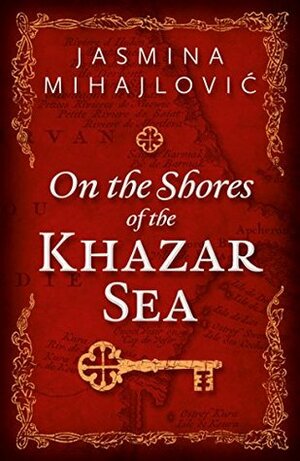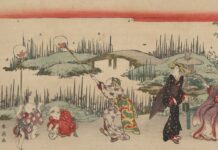Belated Love Letters
Excerpts from book On the shores of the Khazar Sea by Jasmina Mihajlovic; each of these memories (letters) begins with a passage from Milorad Pavić’s last book, Artificial Mole.
(Part-2)
To read Part-1, click here
*****
The Pearl Necklace
– All right. Just one more question. Have you been loved?
– Yes. Did you not find that close to reason? And we didn’t hide it, Philip nor I; that was clear to everyone who saw us.
– Well how do you expect them to not envy that? – concluded Neil Olson – I’m surprised you escaped here so late. You bore a lot of that hatred. That wasn’t easy. Firstly for you. They took revenge on you for all they couldn’t on Philip… You must have done some great good to someone, something one doesn’t forget, and that person is how taking his revenge, for the most passionate vengeance is always aimed at a benefactor. But that’s not so important. Your current position is far from bad. You’re just not aware of that yet. First of all, back home there’s nobody to smoke what you do, as the musician once said. Here there is. As you know, I saw the exhibition in Basel, and it was great. Deja vu. Nobody needs the best painters back home.
– But why?
– They don’t know how to cash you in. And besides, they prefer other not to have than they themselves to have. And here they cash them in very well. So your position isn’t as bad as you think.
(Excerpt from Milorad Pavić’s novel Artificial Mole)
Have I been loved? Yes, I have. With unimaginably great, possessive love, for every great love is exclusive to the point of pain, almost cruelly selfish and dramatic.
Have I loved? Yes, I have. With possessively female love, meaning compliantly, caringly, often nervously, highly sensitively.
One another we loved somehow festively, grandly, as though each to the other was a precious gift.
The first present I received from my husband was a small, lady’s pipe, the color of mahogany! As Pavić was a passionate pipe-smoker, the message of this first gift was clear. I want you to be mine completely, I want you to be my second self, my other half – the present seemed to say. As chance would have it (or not), my first present to my husband was a honey-colored vacuum-sealed ceramic tobacco dish! My gift said: I want you to belong to me alone, but enclosed in my own private little box. During our two decade-long relationship we fought for the supremacy of our loves, one over the other. Endless seduction, ceaseless proving of our love, primarily through creativity. For when two artists are in a romantic relationship, you get emotional chaos.
Love is in itself insatiable in expressing love. It sounds like a paradox, but it’s true. An artist is insatiable in being loved. That is why he creates, and shows his work to the public, because he’s an emotional exhibitionist. He almost shouts: look at me and love me, I need all the love in the world! So the terms artist and love are in essence almost synonymous. Imagine then the private love of artists – like something raised to the N power of love!
I love remembering the romantic gifts. They were all sorts: expensive, silly, small, large, surprising, confusing, although none of them were ill-conceived (with the exception of belts, wallets, caps, gloves, and other appropriate and dumb Christmas gifts). I have to admit, though, that the presents I received were more imaginative than the ones I gave. What can I say; women are always easier to shop for.
If he bought me a kaleidoscope, I’d retaliate with an hourglass, one that, instead of sand, had those thick, multicolored mixtures that trickle slowly. When he bought me a pearl necklace, I’d buy him a decorative button that fastens over the top button of a male shirt, the one at the neck. All over the world I’d buy him little notebooks with blank pages (without lines or squares), of imaginative design, true book-binding gems. That’s probably the most intimate gift to a writer. That’s why they’re starting to make weirdly designed e-books, touch pads, palm tops and other electronic gadgets that have no Serbian translations, just the serbified semi-English names I’m now using[1].
The gift I loved the most was a four-string pearl necklace. I got it for my fortieth birthday. At the stroke of midnight. In a plush box of deep, dark blue. I love fastening it around my neck; I enjoy the moonlight-cold touch of organic matter such as pearl. As though I had wrapped myself in the mystical depth of the oceans. I sense the opaque milky-white sparkle even if I can’t see it, but I clearly and precisely feel the sparkle on my skin. Although the necklace is quite glamorous, I take it with me on every trip, as a good-luck charm. The pearl necklace is my secret fellow traveler at the seaside. As it would be hard to see even a new-age show-biz star swimming in pearls, I come to the beach at night, under cover of darkness, and bathe my pearls in the sea water. Thus I ritually return them to their original home, I renew their energy. In fact we are all more or less made up of salt water. That’s probably why I consider the pearl necklace my most previous gift. It is me, an organic me, only more long-lasting!
The Paris Kiss
– Please, don’t ask me anything. Especially not about painting. When I met you, to me, and not just to me, in fine arts you were a god. Imagine how a person feels when a god asks her for advice. You don’t even know how to think about anything but painting. And I’ve had enough. I don’t even feel like a born painter. You live to paint, and I paint to earn a living. Your life isn’t life, your life is painting. You’re eighty, you’re ill and we’ve forever missed the opportunity to have a lovely life together. We could have, and I told you on time, but you didn’t understand. And now it’s too late. I can also tell you that I can’t paint in the same room as you. Our two wavelengths overlap in this room and interfere with each other. And anyway, I want to live, and not to paint. I know that I’d have done better as a painter had I not been known as the wife of a famous painter. Had I not been linked to you. I’ve come to the conclusion: whatever is good for you, is bad for me. I must always do the opposite, or else I’m doomed.
(Excerpt from Milorad Pavić’s novel Artificial Mole)
My novel The Paris Kiss ends with the sentence: “I’m an incredibly lucky person because I wasn’t afraid to love.” When I read that sentence now, lonely as I am to my core, it first seemed to me pompous, and then I realized that it’s true. All elations and troubles in life come from the willingness to unreservedly love anyone or anything: a partner, child, relative, an animal, God, your homeland, town, job, a book, an object, even a hill, a landscape, a flower….
Pavić and I passionately loved Paris. First and foremost its atmosphere and architecture. It’s seductive ability to transform from a metropolis to a mystical, cramped medieval stone town, the Parisian excitement about everything artistic, hedonistic, bizarre, highly stylized, relaxed, happy, about things that celebrate life. Paris, as compared with Belgrade, was to me something like a lover. An alternative passion. My alter ego made up of almost eternally pubescent anticipation of something big and grand.
Since we lived in Paris from time to time, we were able to discover it layer by layer. A tourist has the opportunity to fall in love with a town in an instant. like a passionate love at first sight. The inhabitants of a town, on the other hand. are not fully aware of their love or hatred for their habitat. The two of us had the privilege to fall in love with Paris, then out of love, and so in cycles.
I recall several Christmas moments in Paris. We’re at the Place des Vosges, it’s drizzling warm French rain, under the arcades surrounding the square a male Romanian troupe is playing a tango. They have narrow, pinstriped black suits and white shoes with spats. As though they had stepped out from a different time onto the scene of the square. The sound of their music passes through the arches of the arcade and multiplies. I’m endlessly in love with Milorad at that moment and I think that this love can never fade, to the end of eternity, and that mortality cannot touch us.
We’re walking through Marais, a district of narrow, winding streets. First dusk is clinging to the low Parisian sky. On one corner we come across a miniscule park. Just a few benches and a sign: the Singing Garden. An ecological project has planted trees that certain birds are partial to. At dusk, as they prepare to sleep, each alights on its favorite tree and they sing as a choir. A true, harmonizing choir! Artificial nature. I lie down on a bench, put my head in my husband’s lap, close my eyes and imagine I’m the bodiless essence of love. Nobody can hurt me any more, I silently repeat as a prayer.
We have dinner on the Champs–Élysées, a platter of shellfish, crabs and tiny cobalt-black snails. I’m fully aware of where I am. There is nowhere I would rather be. The lights of the boulevard, the murmur of the guests and passers-by, the noise of traffic, all those sounds unite into one tone that slowly dies down in my mind. I raise my head, and the first autumn leaf falls from the tree above me. It falls slowly, as though in zero gravity, I hear it rustle as it alights. It lands in my plate and that makes me perfectly happy and content.
Escape Across the Bridge
“Be as happy as you can!” – Milorad Pavić, Second Body
I believe more and more deeply that the saying – time heals all wounds – isn’t true at all. The more time passes, the stronger the love pain of eternal farewell within me. Like a growing chasm that I cannot fill with work, or writing, or travel, or outings, medication, various pastimes, chocolate, cigarettes, rationalization – with anything! I try to block the memories, build them a wall, raise it higher and higher, but the demons of remembrance leap over it with ease.
I recently recollected how Pavić and I used to cheat New Year’s Eves. Since the worst time to travel is at vacations, holidays, and New Years’, we came up with a way to as painlessly as possible overcome pre-holiday rush and post-holiday stupor. Just before the year’s end we’d book an apartment in a lovely hotel in Novi Beograd[2]. For two days before New Year’s Eve and two days after. We’d pack our things for the mini “trip”, cross the bridge from the old town to the new and the idyll would begin… The condition for this fake New Year’s trip was that we didn’t dash over to our Dorćol apartment once during the whole stay, and that we tried to not even cross the bridge. The river as a barrier gave us the psychological deception of escape.
Rested, as there had been no pre-travel and travel hassle, we’d dive straight into pleasures with gusto. Swimming in the indoor pool, pre-New Year’s lunch at the restaurant, private New Year’s Eve diner in our room perfectly dressed up, watching the fireworks through the windows of the fourth-floor apartment, inviting friends over for a slice of cake on the afternoon of January 1st under the sparkling, ornamented dome of the hotel. It was magical! I didn’t have to go to the shops, we didn’t have to battle through air or road traffic jams, there were no indecently expensive tours with even more indecently expensive New Year’s Eve dinners to pay for. We could finally enjoy one another, at leisure, fully relaxed, and in our own city at that!
We managed to have two such New Year’s Eves. They were the loveliest, financially the cheapest, and the most loving – and therefore the dearest. It was almost like having two New Year honeymoons. They really did resemble honeymoons: festive atmosphere, a hotel and rooms specially decorated, a marital bed like a large pudding, sweet sleepless nights, presents, fancy clothes, breakfasts in bed, whispers on the pillow, a large bathtub filled with scented salts that I would buy especially for the occasion and bring to the hotel from home, across Branko’s Bridge.
When I think of how many friends and relatives visited us then! They all wanted to escape from their overcrowded holiday dinner tables to something different, to a hotel, to alleviate the mental burden of the horror of holidays. We infected them with our game, the semi-trip, drew them into the deception that they, too, had traveled to a distant location. They would enjoy sipping their coffee with a piece of cake, relaxed for not being at home or visiting, even though they would have had at least two slices of cake on their plate there. But this cake was sweeter, flavored with total freedom.
Hotels have, generally speaking, played an important role in our life as a writer couple. We traveled a lot, and I loved those hotels we stayed at, just as much as I loved the towns or sights we visited. Hotel rooms are not just inns to me, they are my second home. In them I feel released from everyday toil, and I can write more relaxed than at home. At least for a short while I feel like a carefree aristocrat with servants, an estate, a garden. The various views from the windows of those rooms have changed my view of the world. Honed it, revitalized it, made it broader and more powerful. I’m thankful to our trips together for giving me such expanses of the mind.
And now begins my life, part 2. Apprehensively I watch it take shape. It’s fundamentally shaken loose, chaotic, sometimes it seems to me that I’m acting it instead of living it. From time to time it resembles nunhood, more often a 100 meter business marathon. In any case I am no longer whole; I miss my other half, my beloved. But I will try to be as happy as I can!
[1] Many English terms in the fast-evolving world of IT and electronics are not translated into Serbian, merely transliterated or simply slightly adapted to the Serbian language (translator’s note).
[2] One of the 17 Belgrade municipalities, whose name means “New Belgrade”, located just across the Sava River from the municipality of Stari grad (“Old Town”) which includes the Dorćol district (translator’s note).
About the Author

Jasmina Mihajlović was born in Niš (Serbia). She is a writer, literary and hyperfiction critic. She manages “The Milorad Pavić Bequest”, Serbia. She graduated in 1987 from the Faculty of Philology at the Belgrade University – Department of Yugoslav and foreign literature. She has taught literature in Belgrade secondary schools since 1987; from 1991 to August of 1999 she was Director of the Council for promoting Serbian culture abroad, with the World Serbian Community seated in Geneva. She is member of the Serbia Literary Society.
More about her at https://www.khazars.com/index.php/en/web-jasmina-mihajlovic/biography-and-books.html

















